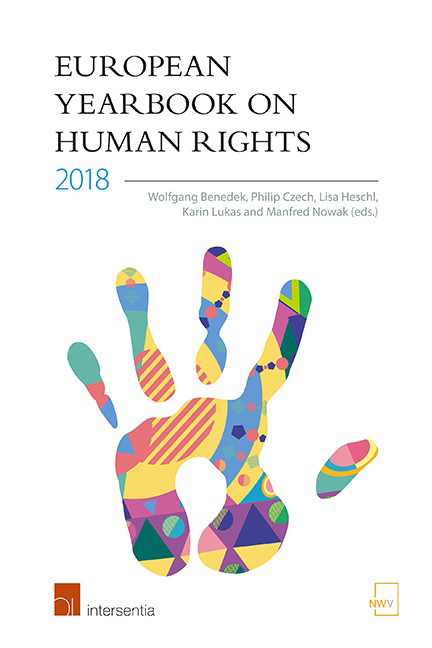Book contents
- Frontmatter
- Scientific Advisory Board
- Editors’ Preface
- Contents
- List of Abbreviations
- List of Contributors
- Part I Topic Of The Year
- Part II Eu
- Part III Coe
- PART IV OSCE
- Part V Others
- Part VI Book Reviews
- Katja S. Ziegler, Elizabeth Wicks and Loveday Hodson (eds.): The UK and European Human Rights – A Strained Relationship?
- Emily Reid: Balancing Human Rights, Environmental Protection and International Trade – Lessons from the EU Experience
- Nicole Bürli: Third-Party Interventions before the European Court of Human Rights
- Stijn Smet and Eva Brems (eds.): When Human Rights Clash at the European Court of Human Rights – Conflict or Harmony?
- Violeta Moreno-Lax: Accessing Asylum in Europe, Oxford Studies in European Law
- Mark Dawson: The Governance of EU Fundamental Rights
- Philip Leach: Taking a Case to the European Court of Human Rights, 4th Edition
- Sionaidh Douglas-Scott and Nicholas Hatzis (eds.): Research Handbook on EU Law and Human Rights
- Lauri Mälksoo and Wolfgang Benedek (eds.): Russia and the European Court of Human Rights – The Strasbourg Effect
- Index
Emily Reid: Balancing Human Rights, Environmental Protection and International Trade – Lessons from the EU Experience
from Part VI - Book Reviews
Published online by Cambridge University Press: 31 January 2019
- Frontmatter
- Scientific Advisory Board
- Editors’ Preface
- Contents
- List of Abbreviations
- List of Contributors
- Part I Topic Of The Year
- Part II Eu
- Part III Coe
- PART IV OSCE
- Part V Others
- Part VI Book Reviews
- Katja S. Ziegler, Elizabeth Wicks and Loveday Hodson (eds.): The UK and European Human Rights – A Strained Relationship?
- Emily Reid: Balancing Human Rights, Environmental Protection and International Trade – Lessons from the EU Experience
- Nicole Bürli: Third-Party Interventions before the European Court of Human Rights
- Stijn Smet and Eva Brems (eds.): When Human Rights Clash at the European Court of Human Rights – Conflict or Harmony?
- Violeta Moreno-Lax: Accessing Asylum in Europe, Oxford Studies in European Law
- Mark Dawson: The Governance of EU Fundamental Rights
- Philip Leach: Taking a Case to the European Court of Human Rights, 4th Edition
- Sionaidh Douglas-Scott and Nicholas Hatzis (eds.): Research Handbook on EU Law and Human Rights
- Lauri Mälksoo and Wolfgang Benedek (eds.): Russia and the European Court of Human Rights – The Strasbourg Effect
- Index
Summary
The book Balancing Human Rights, Environmental Protection and International Trade–Lessons from the EU Experience arose from doctoral research undertaken by Emily Reid, Associate Professor for European Union Law at Southampton University. The text provides a thorough examination of possible ways to reconcile interests of ‘ non-economic ‘ nature with trade liberalisation.
This academic publication is particularly concerned with the conflict inherent in the simultaneous pursuit of human rights and environmental protection on the one hand and economic interests on the other. This selection of interests is explained by the need to address contemporary issues, such as climate change and the emerging aspiration of sustainable development. In analysing the current international legal system as well as the conduct of trade liberalisation regimes, the author assesses the potential and limits of the existing international regulatory framework to accomplish the said reconciliation.
The book is divided into two parts: the first part focuses on the approach of the European Union (EU) to protect non-economic interests, namely human rights and environmental protection, as well as the development of these interests, as objectives in themselves. It also analyses the extent to which the EU has succeeded in balancing these non-economic interests and its initial purpose of economic liberalisation. In the following part, Reid turns to the World Trade Organization (WTO), where the relationship between economic and noneconomic interests is presently being developed and she examines in detail the diverging approaches to environmental protection and human rights issues in the WTO.
The author argues that in the EU, the development of both human rights and environmental protection were initially driven by economic concerns. Their evolution towards objectives as an end in themselves was due to a combination of Member State and Court of Justice action, followed by institutional action and amendment of the treaties. For this development, the pre-existing common consensus in terms of values within the EU has been of particular importance. Providing an in-depth analysis of relevant EU case law, Reid notes that, despite the Court‘s approach in the case Preussen Elektra, there is no hierarchy between social, environmental and economic interests but that these interests must be weighed against one another.
- Type
- Chapter
- Information
- European Yearbook on Human Rights 2018 , pp. 601 - 604Publisher: IntersentiaPrint publication year: 2018



